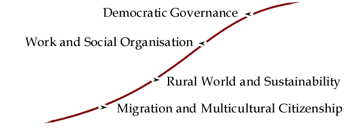

The topics proposed for discussion were chosen as the major common European challenges. They are:

Following are abstracts of the topics, which are otherwise presented in detail in the discussion papers.
The key question has to do with adapting decision-making structures and mechanisms to the present and future challenges that Europe is inevitably facing, which requires collectively and democratically discussed solutions.
The crisis of representative democracy in the European Union is due to two main factors:
- The inappropriateness of the present democratic mechanisms: Although in the past decades there have been drastic changes in every field, we have maintained the same democratic structures and mechanisms. This has led us today into a situation of generalised disenchantment regarding our political parties and representatives. The ensuing lack of trust has brought on situations in which political decision-making processes are totally obstructed …
- A lack of democratic recognition of Community institutions. The key European institutions, the Commission and the Council, are clearly non-democratic, and the European Parliament suffers not only from having very limited power, but even more so from the lack of a democratic foundation from which it could draw its legitimacy.
The renewal and adjustment of European democracy necessarily requires the participation and a more direct involvement of its citizens, which would bring about greater accountability, hence greater trust with regard to indispensable decisions. What are the necessary conditions to achieve this?
II. Work and Social OrganisationIn the industrial societies, work - or, to be more exact, its controlled form, employment - became progressively and definitively after World War II, the single exclusive mechanism for social organisation. It organises both lifestyles and time. Not only does work make it possible to obtain the income needed for a decent life, housing, food, etc., it also guarantees access to social welfare (health, unemployment, and pension) and defines the social status and identity of those who work.
It has become increasingly obvious that the economic expansion necessary for providing employment to every citizen - in traditional conditions - has reached its limits. This is why it is indispensable to consider and discuss alternative, or at least complementary mechanisms in order to reverse the growing process of a two-tier society and the marginalization of increasingly more social groups, as observed these past thirty years. Our political representatives have so far bypassed this issue by clinging to economic growth as the only solution to unemployment and the social problems related to it.
III. Rural work and sustainabilityEurope is made up of old nations that were built on a rich rural history that is still very much alive. It has also changed a lot and become one of the world's wealthiest and most densely populated zones. Facing the limits of its natural resources, it must now meet the challenges of sustainable development. Urban and rural Europe can no longer avoid joining to consider the future of its territory, the use of its countryside, their social, environmental, and educational functions, and the links that need to be developed between cities and the countryside.
The gap between the present agricultural and environmental policies and the challenges raised by an urban Europe with increasingly ageing and idle citizens is no longer tolerable. It has become urgent to propose new European policies for the rural world, food, and agriculture.
It has finally become clear that the European Union can hardly remain an island of prosperity and peace in a world of extreme poverty, hunger, disease, and war. This forces us to define our responsibility and contribution to offset the extreme contrast of wealth and poverty between the North and the South, and the East and the West. And even though it is clear that emigration from the poor countries to the rich countries cannot be the ultimate solution to this situation, such migration exists and is bound to increase in the future. This means that emigration is unavoidable, in addition to being necessary because of the increasingly ageing population of the industrialised countries.
Starting from this fact, the main questions are: In what conditions will immigration and the social integration of the new migrants continue to develop? In its illegal forms, as presently, controlled by criminal organisations and in inhuman conditions, or in a more organised, controlled, and human way? Furthermore: What will be the bases for cohabitation between immigrant and native populations: discrimination, condemnation, exploitation, and marginalization, or peaceful and socially responsible integration to achieve a multicultural society mutually enhanced by the cultural contributions of all groups? What, in particular, will be the means to buffer the possible ensuing religious and cultural clashes?
All four of these topics consider Europe's position in the world: Can the European construction constitute a reference in the construction of world governance? Can it contribute to the making of globalisation with a human face?
Updated